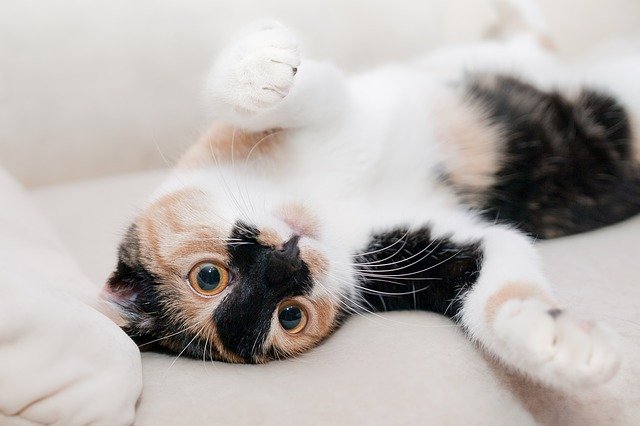- Not a substitute for professional veterinary help.
Since cats spend most of their time snoozing away, it makes sense that when they’re really relaxed, you might hear a snore here and there. Just like with humans (and dogs too) this is totally natural and shouldn’t be an issue. If you have a cat that is snoring up such a storm that it’s concerning you, there could be some other things going on under all that fluff and cuteness.
Why do cats snore?
Cats have sleep cycles just like we do, which include REM and deep-sleep non-REM cycles. During those REM cycles you might see your cat “chasing butterflies” or hear them make small mewls. During the deeper, non-REM sleep cycle is when snoring usually occurs, indicating your cat is in a complete, relaxed sleep.
Cats who sleep in unusual positions or are overweight may snore more than others, simply because there may be pressure on their respiratory systems. If your cat is of a brachycephalic (also called short-nosed or flat-faced) breed, such as Persian, Himalayan or Burmese, snoring may be more pronounced and may occur more often simply because of the construction of their airways and palates.
When is snoring bad?
Snoring generally isn’t an issue on its own but if you notice your cat’s snoring is combined with other symptoms, it may be time to check in with your vet. Here are some common signs your cat’s snoring may be caused by something else.
Discharge from nose or eyes, sneezing, sores in mouth or on tongue: These are all signs of an Upper Respiratory Infection (URI). Similar to a cold in humans, URI is very common in cats, especially those that have come from a shelter, spent time in a boarding facility, or have regular contact with other cats outside of the home. “If you have a cat that suffers from upper respiratory infections, or chronic nasal inflammation or rhinitis, it’s likely that cat will be a snorer,” Dr. Andrea Jones, a veterinarian at Princeton Animal Hospital & Carnegie Cat Clinic tells PetMD. The congestion caused by URI can amplify a cat’s snores but, in general, will self-resolve. If your cat is showing other signs of discomfort, such as trouble breathing, lethargy, loss of appetite, or fever, your vet can prescribe antibiotics to help get them on the mend.
Snorting, coughing, or open-mouth breathing: if you have a brachycephalic cat, these, combined with excessive snoring, can be signs of brachycephalic airway syndrome. If your cat isn’t a brachycephalic breed, these could be signs that your cat may be having some respiratory issues caused by anything from a polyp to a foreign object such as a piece of grass, which, of course, would make snoring more pronounced. Another one to call your vet about to make sure your cat has all the air they need.
Lethargy, fever, loss of appetite: these are all signs that your cat isn’t feeling well and whether any of them make snoring worse or not, you should immediately put a call in to your vet.
Trouble swallowing, extension of neck when swallowing, retching: these can be signs that your cat may have something stuck that shouldn’t be there. If your cat is not coughing up a hairball and is displaying these behaviours, you may want to consult your vet. There is a chance your cat might have swallowed something they shouldn’t have, such as a foxtail or toxic plant, and it’s always better to be safe than sorry.
Swelling on the face, head, or neck: these can be a sign of dental issues or abscess and can make breathing difficult, not to mention be painful and even dangerous to your cat’s health. If your cat’s face or neck is painful or swollen, check immediately with your vet.
Is there anything else I can do about cat snoring?
If snoring is really of concern, there are some things you can do to ensure your cat’s respiratory system is good and healthy.
Address weight concerns: if your cat is overweight, get them started on a diet to shed those extra pounds that may be weighing on their respiratory system.
Exercise: exercise is good for cats for emotional as well as physical reasons. Not only does exercise help your cat stay svelte, but it also provides mental stimulation to keep them happy and curious. Invest in some fun toys, such as lasers or feather sticks, that will get them excited.
Fresh air: just like for humans, a good dose of fresh air can do wonders. If you have a screened window, get your cat a tree or bed so that they can take advantage of fresh air while watching the world outside. Even better, if you have the space, build your cat a catio!
Dryness: if you live in an area with very low humidity, the dry air can be as uncomfortable for a cat as it is for us. Try a humidifier in the room the cat sleeps in most. Adding some humidity to the environment might just be the ticket to give your cat, and you, a silent night’s sleep.




